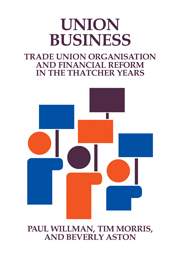Book contents
- Frontmatter
- Contents
- Acknowledgements
- 1 Introduction: unions in the 1980s
- 2 The financial status of British trade unions 1950–1989
- 3 Financial differences between unions
- 4 The role of financial matters in union organisation
- 5 The politics of union finaces
- 6 Union size, growth, and financial performance
- 7 Strike activity and union finances
- 8 The National Union of Mineworkers: strikes and financial disaster
- 9 The GMB: merger and financial reform
- 10 The Amalgamated Engineering Union: back from the brink
- 11 The Banking, Insurance and Finance Union: competitive unionism and financial survival
- 12 The Electrical, Electronic, Telecommunications and Plumbing Trade Union: accountability and financial control
- 13 Conclusions: union business and business unionism
- Appendix 1 Research methods
- Appendix 2 Regression results
- Appendix 3 Questions for finance officers
- Appendix 4 Questions for General Secretaries
- Appendix 5 Questionnaire: trade union finances
- Appendix 6 The number of trade unions
- Notes
- References
- Subject index
- Index of trade unions
- Author index
8 - The National Union of Mineworkers: strikes and financial disaster
Published online by Cambridge University Press: 11 March 2010
- Frontmatter
- Contents
- Acknowledgements
- 1 Introduction: unions in the 1980s
- 2 The financial status of British trade unions 1950–1989
- 3 Financial differences between unions
- 4 The role of financial matters in union organisation
- 5 The politics of union finaces
- 6 Union size, growth, and financial performance
- 7 Strike activity and union finances
- 8 The National Union of Mineworkers: strikes and financial disaster
- 9 The GMB: merger and financial reform
- 10 The Amalgamated Engineering Union: back from the brink
- 11 The Banking, Insurance and Finance Union: competitive unionism and financial survival
- 12 The Electrical, Electronic, Telecommunications and Plumbing Trade Union: accountability and financial control
- 13 Conclusions: union business and business unionism
- Appendix 1 Research methods
- Appendix 2 Regression results
- Appendix 3 Questions for finance officers
- Appendix 4 Questions for General Secretaries
- Appendix 5 Questionnaire: trade union finances
- Appendix 6 The number of trade unions
- Notes
- References
- Subject index
- Index of trade unions
- Author index
Summary
Historical background
More than any other union, the finances of NUM have been subject to public scrutiny since the year long dispute with the National Coal Board in 1984–5. The dispute proved to have major consequences for the union because of the size of funds involved, the loss of almost all membership income for such a long period, the protracted nature of the litigation which the union faced, and the publicity shed by the Lightman Inquiry, set up by the NEC to investigate financial management in the union during the dispute (Lightman, 1990). As we shall see, the federal structure of NUM affected its capacity to respond to financial crisis even after the dispute was over. While the leadership of NUM has responded to this with a number of important reforms, it remains clear that even extreme financial pressures have not altered the industrial policies of the union.
The National Union of Mineworkers (NUM) came into being in 1945, following the effective wartime nationalisation of coal production in 1942. It was formed out of the Miners' Federation of Great Britain, set up in 1888 and comprising some 40 separate local organisations. NUM is often regarded as an industrial union and, to the extent that its members are confined to coal and coke production, it is, but it shares the industry with three other unions. The British Association of Colliery Management (BACM), which came into existence in 1947, represents all those engaged in professional, technical, and managerial grades in the mining industry or associated industries and the National Association of Colliery Overmen, Deputies and Shotfirers (NACODS) organises those who have statutory qualifications as colliery deputies.
- Type
- Chapter
- Information
- Union BusinessTrade Union Organisation and Financial Reform in the Thatcher Years, pp. 121 - 139Publisher: Cambridge University PressPrint publication year: 1993



